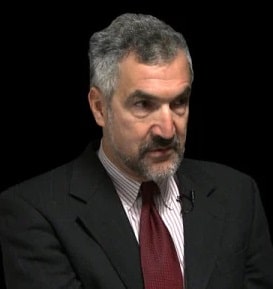World Geostrategic Insights interview with Daniel Pipes on how to deal with the new Syrian government, and the prospects for Syria, caught between Türkiye and Israel.

Daniel Pipes is founder of the Middle East Forum, historian and columnist, his special interests include Turkey, the public role of Islam, the Arab-Israeli conflict, the threat of radical Islam, and the liberal-conservative divide. His website, DanielPipes.org, is one of the Internet’s most accessed sources of specialized information on the Middle East and Muslim history.
Q1 – In a National Review article of April 12, 2013, “The Case for Supporting Assad,” you stated that “When enemies of the West are in conflict, it is in our interest to aid the losing side.” About Syria, you added: “Yes, Assad’s survival benefits Tehran, the region’s most dangerous regime. But a rebel victory would hugely boost the increasingly rogue Turkish government while empowering jihadis and replacing the Assad government with triumphant, inflamed Islamists.” Twelve years later, do you stand by this observation?
A1 – I do – and thank you for recalling that quote. A defunct ideology, a dismal economy, and a forever-civil war meant that the wretched, worn-out Assad regime posed a limited danger to Western interests. We do not know how Syria’s transitional government of Hayʼat Tahrir al-Sham (HTS) under Ahmed al-Sharaa will turn out but two factors render me pessimistic: Sharaa is a jihadi from a Qaeda and ISIS background and he works closely with the dynamic, aggressive, and ideological regime in Türkiye.
Q2 – Speaking of Türkiye, Ankara stands as the leading ally of the transitional government, it hopes to establish Turkish in Badiyah, central Syria, it plans to train the Syrian army, and much more. Why do the Turks devote so much attention to Syria and what might be the consequences of their close ties?
A2 – Despite Recep Tayyip Erdoğan’s being the powerful, near-dictatorial leader of a large country for over twenty years, Türkiye has institutions that go back a century that even he cannot ignore; note, for example, his recent electoral losses in the country’s two most major cities, Istanbul and Ankara. In contrast, Syria lies in a state of anarchy after the civil war of 2011-24. By helping his Islamist HTS proxy reach power, Erdoğan has the unique opportunity to build a Sunni jihadi state. To take the most obvious aspect: while Erdoğan can call for Israel’s destruction and aid its Hamas enemy, he cannot actually engage in violence against the Jewish state. But his Syrian proxy can.
Q3 – What do you expect in terms of relations between Israel and Syria?
A3 – I see continued hostility in Damascus toward Israel. Indeed, it now runs deeper than during prior decades. The Assad regime of both father Hafez (r. 1970-2000) and son Bashar (r. 2000-24), being anchored in the Alawite community, it always came under Sunni suspicion of not truly being anti-Zionist, and so had to compensate through aggression. Now that Sunnis are fully in charge, their deep and abiding anti-Zionism will find full expression.
Yes, in the short term, Israel has benefited from HTS’ overthrow of the Assad regime and the consequent reduction of Iranian power in Lebanon. Plus, anarchy permitted Israeli forces to destroy much of Syria’s arsenal and create buffer zones in the country. In the long term, however, as Syria’s economy and military revive, I predict major problems.
Q4 – In mid-May, President Donald Trump announced the lifting of U.S. sanctions against Syria and met with Sharaa. Please assess those steps.
A4 – It represents another example of Trump’s unorthodox diplomacy. In part he took this step at the behest of his strongman Middle Eastern buddies (Erdoğan, Mohammad bin Salman, Mohamed bin Zayed) and in part, he did so to repudiate decades of his predecessors’ policy, which he instinctively scorns. Because I see the new Syrian government as a jihadist tool of Ankara, providing it with unconditional benefits strikes me as a mistake.
Daniel Pipes – Founder of the Middle East Forum







